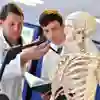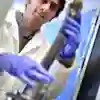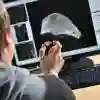




Develop the specialist knowledge and skills you need to enhance patients’ quality of life and improve healthcare.
An ageing population combined with a continuous drive to improve quality and equality of care means increased pressure on the healthcare system and budgets. The demand for qualified biomedical engineers who can create and deliver healthcare solutions and technology is greater now than ever before.
Taught by research-active staff, you’ll explore how the human body works and how to apply engineering skills to solve medical and healthcare challenges.
About this course
With first-hand experience of medical device development, we’ll mentor you as you implement your ideas. We’ll take you through every step of the process. From concept design and material selection, through to analysis and optimisation, and regulatory approval.
You’ll enhance your lab skills, carrying out physical testing on biomaterials and learning industry-standard techniques in medical image analysis and processing for modelling purposes. Build your research skills though a project of your choice. And consider sustainable approaches in creating solutions, along with cultural, equality, and health and safety responsibilities.
Our biomedical engineering research aims to solve clinical challenges and reaches industry standards with our ISO accreditation. The broad expertise of our research-active lecturers informs our teaching and stretches across the medical engineering spectrum - from macro level to micro scale. Our strong relationships with industry give you opportunities to work on real-world research and hear from guest speakers in the sector.
You’ll graduate with the skills to succeed in the biomedical industry – a sector that’s worth hundreds of billions of pounds globally.

MSc Biomedical Engineering
2 mins
Module options
For a full Masters degree, you'll study 180 credits over the duration of your course. Some programmes offer a Postgraduate Diploma (PGDip) qualification or a Postgraduate Certificate (PGCert) qualification. For a PGDip, you'll study 120 credits, and for a PGCert, you'll study 60 credits.
Filters
Tissue Mechanics and Mechanobiology: Materials, Modelling and Adaptation
Materials of the natural world around us are multifunctional, heterogeneous, highly adapted and highly optimised over millions of years. Knowledge of their structure and properties, as well as methods for testing their performance are a prerequisite for understating the world around us, and for the design of new man-made materials, and for material substitutes.
compulsory
20 credits
Biomanufacturing for Healthcare Applications
Biomanufacturing for Healthcare Applications will introduce you to the manufacturing and imaging of biomaterials. You’ll develop skills in design and manufacture, and have the opportunity to design, manufacture, and test your own microfluidic device.
compulsory
20 credits
Engineering for Health Inequalities
Engineering for Health Inequalities will provide you with the skills to develop solutions to real world health inequalities challenges. Whether it be providing healthcare in a resource limited area, or solutions to healthcare challenges that have been long ignored. In this module you will look at real world problems, posed by clinicians from the UK and overseas, and design your own solutions to these challenges.
compulsory
20 credits
Project Management and Research Skills
This module introduces you to a structured approach to planning/bidding, managing and controlling a project. You'll explore current practices, topics and methodologies relevant to contract and project management. You'll develop research skills for designing, planning and conducting an academic or industry-based engineering project.
compulsory
20 credits
Medical Device Development and Testing
Medical Device Development and Testing will offer you the opportunity to learn about the processes and regulations involved in developing and testing new medical devices. This will be part delivered by industry experts and you’ll be assessed by your response to case studies based on real world devices.
compulsory
20 credits
Medical Imaging, Processing and Analysis
You'll become familiar with the use of professional image processing systems and the full workflow from image acquisition to interpretation in a range of imaging modalities.
compulsory
20 credits
MSc Project
This module gives you the opportunity to carry out an individual design or research and development project. It is an opportunity to gain a wider perspective of society and sustainability, while exploring project management techniques and presentation of progress, milestones and results through a variety of media.
core
60 credits
Our academics
Often working in partnership with clinicians and industry, we aim to develop and apply new medical technologies, techniques and devices that improve quality of life; enhance healthcare efficiency, effectiveness and accessibility; and provide insight into disease causes, diagnosis and treatment.

Professor Peter Zioupos
Emeritus Professor of Biomedical Engineering
Peter has an interest in Musculoskeletal science and research and their link to Orthopaedic Biomechanics, Bone physiology, Anatomy and Forensics.

Dr Sarah Crossland
Lecturer in Medical Engineering
Her current body of research looks at the tribological interactions of the diabetic foot to investigate skin response and further understanding of the formation mechanics of diabetic foot ulceration.
Entry Requirements
What do I need?
When it comes to applying for this Postgraduate Taught degree, you'll need an Undergraduate degree (or equivalent). For this course, you'll need a 2:2 from a relevant bachelor's degree.
The programme is designed for graduates who have a studied a subject that is relevant to this course.
If you’re an undergraduate student at Hull, you’re guaranteed a fast-track route to this postgraduate degree, as long as you meet the entry requirements.
In order to ensure our students have a rich learning and student experience, most of our programmes have a mix of domestic and international students. We reserve the right to close applications early to either group if application volumes suggest that this blend cannot be achieved.
Typical offer
2:2 in a relevant subject area
Applicants should have an Honours degree (typically 2.2 or above, or international equivalent) in an engineering or related discipline.
Fees & Funding
How much is it?
Tuition fees for 2027 entry have not been confirmed. Please use 2026-27 information as a guide.
Scholarships
We offer a number of awards, bursaries and scholarships for eligible students. They’re awarded for a variety of reasons including academic achievement and/or to help those on lower incomes.
Scholarships and bursaries are separate to student loans. And the best bit is, you don’t pay a penny back.
Alumni Postgraduate Scholarship
University of Hull undergraduates progressing to a taught masters course may receive a 20% discount on the cost of their tuition fees.
Find out if you’re eligible by visiting the University of Hull Alumni Postgraduate Scholarship page.
See more Scholarships
We offer a range of scholarships and awards to students at the university to help with their financial load.
To view all of our scholarships and determine whether you're eligible, please visit our Scholarships and Awards page.
Our facilities

Future prospects
Our courses give you the skills to succeed in an industry worth more than £300 billion (Kalorama, 'The Global Market for Medical Devices', 2017).
Medical engineers often work in hospitals, research facilities and regulatory agencies. Major medical device companies, such as Smith & Nephew (who have their Advanced Wound Management base right here in Hull) and Johnson & Johnson, employ graduates to design and deliver projects. Many of our students receive offers of employment even before they graduate.
Our BEng degree is a recognised qualification towards Chartered Engineer status. And our MEng qualification fully meets the academic requirement for Chartered Engineer status.
Take your career to the next level
Like what you’ve seen? Then it’s time to apply.
Make your application online now, and our admissions team will get back to you as soon as possible to make you an offer.
Not ready to apply yet?
We regularly deliver virtual and on-campus events to help you discover your perfect postgraduate course, whether it’s a subject you already love or something completely different. Our events are an opportunity for you to chat to tutors and current students and find out about the career options a postgraduate degree could lead to.